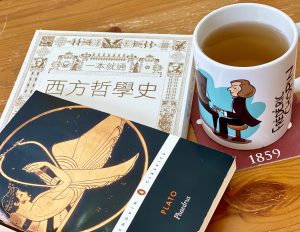
This sunny morning, I am enjoying the freshly brewed Taiwan high mountain tea in my favorite Chopin coffee mug acquired from Chopin Museum in Warsaw, Poland, whilst listening to Horowitz playing Chopin’s Ballade in G minor. This is truly a heart-warming, perhaps even a little serene moment, especially given the quiet, sub-zero frozen weather outside. Before me on the desk are two books that I acquired at the once trendy Eslite Bookstore a few years ago in Taipei. The Eslite Bookstore had huge selections: books, magazines, and even fine coffee/tea along the side, with hundreds of readers visiting there daily. Sadly, it closed in 2020 due to financial difficulty like many other fine bookstores around the world. The bookstore might be gone, the fond memory remains, much in the same manner with other good things in life. I pity over the fact that many book readers are these days becoming readers of electronic devices — such transition may save a few trees if one wishes to spin it hard to be positive, but humans do lose much more, such as the smell of new and old pages, as well as a fancy bookmark, perhaps. It is simply a different experience. Cicero once said, “A room without books is like a body without a soul.” And I honor him utterly by having a folding magazine self in my bathroom–we are in full agreement, after all. I have, yet, another grave concern this morning over the white-cover book “A History of Western Philosophy” as shown in the picture above. Readers could be easily misled by its coverage of the ancient Greek classics should they not have the experience of reading those books themselves. The author is a well-respected Taiwanese scholar, Yale-trained, who has probably done a terrific job in discussing contemporary and modern philosophy due to marked influence from scholars of the Frankfurt School. His views on the Greek classics, however, fall miles short given his sophist perspective that is both atheist and agnostic. A good student of the Greek classics ought to be spiritually, if not divinely, on the journey of seeking wisdom, meaning, and insight of higher dimensions, so as to appreciate in depth the works of Plato and others. Here I don’t question the good intention of this Taiwanese scholar, but was a tad disappointed given his Chinese background with the potential to search deeper for “Priori” or in Taoist term for returning to “original truth.” Modern education is producing a new breed of sophistry with the decline of intellectual curiosity. In “The Origins of Totalitarianism,” Hannah Arendt wrote, “The most striking difference between ancient and modern sophists is that the ancients were satisfied with a passing victory of the argument at the expense of truth, whereas the moderns want a more lasting victory at the expense of reality.” There are, apparently, a handful of clever thinkers, perhaps such as Sir Roger Scruton (1944-2020). Though we may not agree with souls like him on every matter, they make us think, if not think harder, especially when society’s “invisible hand” tends to be cultural Marxism these days. In “The Art of Rhetoric,” Plato’s student Aristotle alerted us, “What makes a man a ‘sophist’ is not his faculty, but his moral purpose.”


